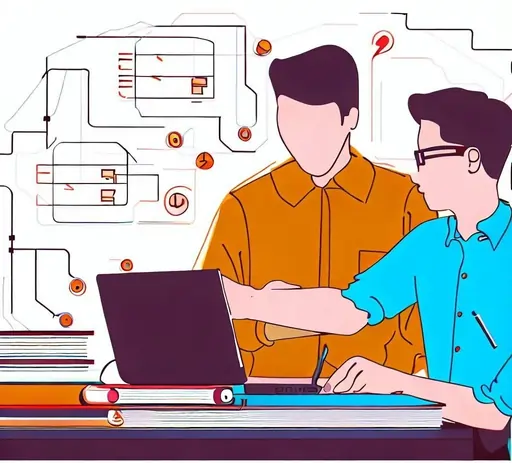In the study of electrical engineering, group projects are essential because they give students a chance to improve their technical proficiency while fostering critical teamwork skills. Students gain the ability to collaborate, delegate tasks, and take advantage of one another's strengths by working on challenging engineering problems. Group electrical engineering assignments must be completed successfully, and this necessitates a thorough understanding of team dynamics, collaboration tactics, and communication strategies.
Electrical engineers rarely work alone to solve complex problems in the professional world. Engineers must collaborate effectively to design, develop, and implement cutting-edge solutions in real-world engineering projects. Electrical engineering students develop the fundamental skills needed to succeed in their future careers by actively participating in group assignments throughout their academic careers.
There are several essential components to working effectively in a group. First and foremost, it's critical to establish specific goals and a common understanding of the assignment's requirements. The scope, objectives, and deadlines of the project should be fully understood by every team member. For everyone to remain on the same page, effective communication is essential.

In addition, assigning tasks to team members based on their unique talents and interests promotes a positive work environment. The team can maximize its overall performance by utilizing each member's area of expertise. Task distribution and progress monitoring can be facilitated by collaboration tools and project management software, resulting in effective team coordination.
Both keeping channels of communication open and encouraging a positive team dynamic are crucial. Regular meetings, both in person and virtually, give team members the chance to talk about progress, address problems, and jointly come up with creative solutions. A supportive team environment is facilitated by active listening, respect for various viewpoints, and constructive criticism.
Considering the Benefits of Collaboration in Electrical Engineering Assignments:
A key component of any engineering education is group projects. Due to the frequently encountered multidisciplinary nature of the projects, they are particularly significant in the field of electrical engineering. One might find themselves dealing with aspects of mechanical engineering, programming, and other disciplines in addition to electronics in this situation. A single engineer might find it challenging to comprehend and carry out every aspect of such projects. Here, teamwork is essential because it brings together engineers with various specialties and backgrounds. When one person may be skilled in programming, another individual may be skilled in circuit design. This wealth of knowledge and abilities can help make difficult tasks more manageable while also closely simulating engineering environments found in real-world settings.
Effective communication is the first step to productive group work. It is imperative to emphasize this. Members of the team must be able to clearly communicate their thoughts, difficulties, and advancement. They ought to respect the viewpoints of their coworkers and try to settle disputes when they arise. Frequent communication of ideas and conclusions can help to avoid misunderstandings and keep everyone on the same page. Regular communication can be facilitated by using a variety of tools, including emails, video conferences, project management software, and cloud-based platforms.
It's crucial to assign roles for a group project that match each participant's skills. Ideal roles would match each person's abilities and passions, enabling them to work efficiently and make meaningful contributions. For instance, one student might have a solid background in circuit design while another might be particularly talented at coding. The team can make sure that each team member is working where they are most productive by allocating tasks in accordance with these strengths, ultimately improving the project's overall quality and efficiency. Additionally, this approach can ensure smoother project execution and help to lessen conflict.
Implementing a Structure and Project Plan that are Clear:
Following the assignment of roles, a detailed project plan should be developed and followed. This entails figuring out the project's scope, setting up checkpoints and deadlines, scheduling regular meetings, and creating a backup plan in case of unforeseen issues. A well-defined project plan gives the team a direction to follow and can help to avoid confusion and pointless delays. Regular gatherings provide an opportunity to review results, address issues, and, if necessary, revise the plan. This organization helps the team members understand one another and keeps the project on schedule.
Any group assignment may experience conflicts, despite everyone's best efforts. They can be brought on by a variety of things, including personality conflicts, work style differences, and differences in opinion. When this occurs, it's crucial to quickly and effectively address the problem. Ignoring the issue could fuel resentment and reduce the team's overall productivity. A structured approach to conflict resolution can help to diffuse the situation and keep the team functioning effectively by emphasizing the issue rather than the person, listening to everyone's point of view, and seeking a mutually beneficial solution.
Peer Learning's Importance in Electrical Engineering Projects:
In projects involving electrical engineering, peer learning is a potent tool. Each team member has a distinctive set of skills and knowledge and comes from a different background. Everyone can learn new skills and gain a better understanding by sharing this information. This exchange of ideas can be fostered through regular meetings and brainstorming sessions, which will help to produce original solutions and raise the project's quality. Additionally, it can make team relationships stronger, fostering better collaboration and a more enjoyable workplace.
Peer feedback is a possibility of group work that is frequently undervalued. People in a team setting have the exceptional chance to evaluate the work of their coworkers and offer both constructive criticism and praise. This practice helps the team foster a culture of learning and continuous improvement while also allowing team members to better understand their own strengths and areas for development. Every team member should feel comfortable sharing their opinions and hearing those of others during regular, structured, mutually respectful feedback sessions.
Projects Using the Agile Methodology in Electrical Engineering:
While the majority of electrical engineering students are accustomed to using methodologies like the waterfall model to manage their projects, looking into agile methodologies can provide fresh perspectives on how to handle group assignments. Agile methodologies like Scrum and Kanban, which were initially created for software development projects, are now being used more frequently in many different industries, including engineering. These methodologies put a strong emphasis on adaptability and ongoing improvement, which makes them especially well-suited for complex projects where requirements may change over time. When working in groups, adopting an agile mindset can help your team be more flexible and ensure that your work is still relevant and of high quality even when faced with unforeseen problems or changes to the project's scope.
Numerous tools and platforms are available today that can improve group assignment collaboration. Teams can work more efficiently with the help of tools like Microsoft Teams, Google Workspace, Trello, Slack, and GitHub, which all offer different functionalities. These include tools for managing tasks, collaborating on documents, communicating, using version control, and other things. When these tools are used properly, your team's productivity can be greatly increased, enabling you to collaborate easily even when you are not physically present.
Creating a Respectful and Inclusive Culture:
The culture of any team has a big impact on its performance. Team cohesion and productivity can be improved by cultivating an atmosphere where everyone feels valued and respected. This entails valuing the contributions of each team member, paying attention to their opinions, and encouraging a sense of community. Encouragement of diversity of thought is also crucial because it can result in more creative solutions. Assembling a diverse team is only one aspect of inclusivity; another is fostering a climate in which people are free to express their individual viewpoints.
While maintaining some degree of independence is crucial when working in groups, collaboration is a key component. This is so that each person can bring their particular talents and insights to the project. It can be difficult to strike a balance between cooperation and independence, but doing so is essential for a positive team dynamic. In between team meetings, individuals can work independently on their tasks while the team meets regularly to collaborate and make decisions as a whole.
The Value of Recognizing Success
Finally, recognizing accomplishments is an important but frequently disregarded component of group work. Recognizing the group's accomplishments, no matter how minor, can improve spirits and drive. There is no requirement for extravagant celebrations. They can be as simple as a virtual high-five or a few words of encouragement during a meeting. Always keep in mind that a team that feels appreciated will be more motivated to give it their all.
In electrical engineering, group projects generally involve much more than just finishing a project. It involves mastering the skills of effective communication, conflict resolution, task management, and teamwork. By using these suggestions, you can get the most out of your group projects and develop valuable soft skills that will help you in your career as well as technical knowledge.
Conclusion:
Working on group electrical engineering assignments gives students a priceless chance to hone not only their technical skills but also their capacity for productive teamwork. Students gain knowledge about the value of task delegation, clear communication, and utilizing the strengths of each team member through these assignments.
Students can develop vital teamwork skills that will help them in their future careers by actively participating in group projects. Engineering projects in the real world frequently involve working with diverse teams, where clear communication and seamless coordination are essential.
Students should concentrate on establishing clear objectives, creating open lines of communication, and dividing tasks based on individual strengths if they want to succeed in group electrical engineering assignments. Teams can improve workflow and track progress by utilizing collaboration tools and project management software.
Additionally, encouraging a positive team dynamic through regular meetings, attentive listening, and respectful communication improves the group's capacity for creativity and problem-solving. The opinions of every team member ought to be respected and included in the final product.
Finally, mastering group electrical engineering assignments necessitates a blend of technical proficiency and successful teamwork. Students can develop the skills necessary to succeed in their future engineering careers by seizing these opportunities. Successful outcomes and maximizing the learning potential of group assignments depend on placing a strong emphasis on clear communication, task delegation, and a positive team dynamic.
